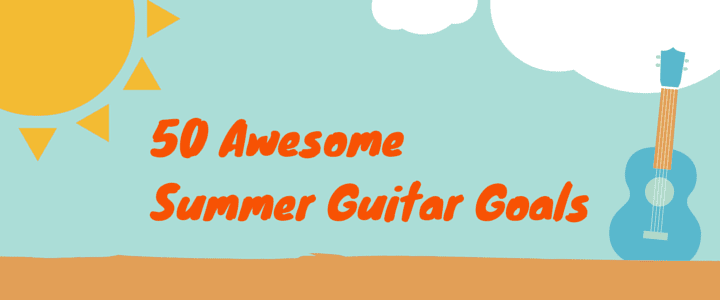Summer’s here, so grab your guitar and some guitar goals with the help of guitar teacher Jerry W.…
Summer has officially arrived, which means the sun is out, the days are long, and you have plenty of opportunities to pick up and practice your guitar! Now is the time to go after those dreams you’ve had of mastering the tricky aspects of learning guitar that have been a roadblock in your practice throughout the year.
To help you get started, we’ve compiled 50 goals that you can focus on when practicing your guitar this summer.
How Can I Improve My Guitar Goals?
From working with a professional tutor to practicing new skills, there are many ways to improve your guitar goals. Some of these are easy fixes, while others take more work, but altogether, they will improve your skills as a guitarist and get you back on track to reaching your guitar goals. So get out your guitar and sunglasses, head out to the beach, and start practicing.
There’s no better place to learn the guitar than in the summer breeze!
1. Take lessons.
The quickest way to improve is to take guitar lessons. A good guitar teacher will be able to tell you what you need to work on and help you achieve your goals.
2. Teach someone else how to play the guitar.
Teaching what you’ve learned to someone else has been proven to improve your memory as well. Plus, now you’ll have a new jam buddy. It’s a win/win!
3. Learn a new song.
Use your summertime to add a few new songs to your repertoire. Consider learning a new song that forces you to become a better player.
4. Memorize a new song.
Memorizing a song will help you master both the music and the technique. It also allows you to play it anytime you have a guitar. If you struggle with memorization, these tips from Easy Ear Training might help you look at memorizing music in a whole new way!
5. Learn a new music style.
Do you always play one style of music? Learn to play a different style. The challenge will give you a reason to practice.
6. Restring your guitar.
How long has it been since you put new strings on your guitar? The beautiful sound of new strings will make your practice time more enjoyable.
7. Get your guitar set up.
Setting up your guitar involves adjusting the parts of the guitar to get the best action and intonation possible. Having your guitar set up will make it easier to play and better in tune throughout its range.
8. Upgrade to a new instrument.
Is now the time to upgrade to a better quality guitar? Better quality guitars can not only sound better but are also easier to play. And, as every guitarist knows, having an instrument you’re proud of is great motivation to play every day.
9. Learn how to play classical guitar.
Are you looking for a different challenge? Learn to play classical guitar. It will help develop your music reading and fingerpicking skills.
10. Learn how to play electric guitar.
Do you only play acoustic guitar? Stretch yourself a little by learning how to play electric.
11. Learn how to bend the pitch.
Bending the pitch is one of the classic soloing techniques for guitar. Add this to your skill set to become a better lead guitar player.
12. Learn how to pull off.
The pull-off is another standard guitar technique that works well for solos, strumming, and picking.
13. Learn how to hammer on.
Like the pull-off, this technique will help you with solos, strumming, and picking. This lesson from Ultimate Guitar will help you learn the basics of both hammer-ons and pull-offs.
14. Learn how to use a capo.
Learning how to use a capo is easy and can really increase the number of keys you can play comfortably.
15. Learn how to palm mute.
The palm mute is a great technique to add to your strumming patterns.
16. Learn how to left-hand mute.
The left-hand mute can add a lot of spice to your strumming.
17. Increase your practice time.
There is no other way to get better at the guitar than to practice. As a general rule, the more you practice, the better you will become.
18. Improve your technique.
Work on improving your technique on the guitar. Remove string buzzing from poorly fingered chords, make sure you are hitting the right strings with your pick or fingers, learn to use the tip of your fingers to reach fret notes, etc.
19. Learn to read music.
Set yourself apart from the crowd of guitar players by learning how to read sheet music for the guitar.
20. Learn to read TAB.
If you learn to read tablature, you will find you have a much larger repertoire of music to play.
21. Learn to read Nashville Number charts.
Nashville Number charts are one more method musicians use to share music. If you’re not already familiar with them, summer is a great time to learn.
22. Learn a new strumming pattern.
Don’t be stuck with using only a couple of strumming patterns. There are so many possibilities.
23. Learn to fingerpick.
To make your playing even more interesting, learn to fingerpick. It will make the guitar sound smoother, and you will be able to play more complex patterns.
24. Learn a new picking pattern.
The number of fingerpicking patterns is nearly infinite. Add some new ones to your bag of tools.
25. Learn to keep a steady tempo.
No one wants to play with a musician who can’t keep a steady beat. Try practicing with a metronome.
26. Join a band.
Playing with others will always make you a better player. Just steer clear of these band practice mistakes!
27. Start a band.
Have you always wanted to have your own band? Summer is a great time to start! Try these tips from Music Industry How To to get the ball rolling.
28. Find someone to play duets with.
Playing duets is easier to do than putting together a band, but you still gain the benefits of making music with someone else.
29. Learn a new tuning.
Using an alternate tuning, or “scordatura,” can make playing certain types of music or certain songs easier to play.
30. Learn how to improvise a solo.
Do you only play chords on your guitar? Use the extra time you have during the summer to learn how to solo.
31. Learn some new guitar licks.
A great way to get started with soloing is to learn how to play some common guitar licks. As you get comfortable playing licks, work your way up to solos.
32. Learn the pentatonic scales.
The pentatonic scale is one of the most common solo scales.
33. Learn the blues scale.
The blues scale is also very common for playing solos, but a little more colorful than the pentatonic scales.
34. Learn major scales.
Most songs are in major keys, so knowing these scales will make it easier to feel the key when playing a solo.
35. Learn minor scales.
This scale is essential for mastering those minor keys.
36. Learn the modes.
Modes are alternative scales that are generated by starting the major scale on a different tone. The modes are most common for jazz improvisation.
37. Learn arpeggios.
Arpeggio is an Italian word that means, broken chord. Essentially, when you play an arpeggio you are playing the notes of the chord individually instead of strumming them. Arpeggios are great for picking an accompaniment or for solos.
38. Increase your speed.
Take any technique, arpeggio, or scale, and learn to play it faster. Use a metronome, and gradually increase the speed.
39. Experiment with new tones.
Whether you’re playing an electric guitar and using a new amp, pedal, and tone settings, or you’re learning to change the tone of your acoustic by picking or strumming in a different place on the guitar (closer to the fretboard will sound mellower and closer to the bridge will sound brighter), learning to change your tone will make your music much more interesting for you to play and for your listeners.
40. Learn chords in a different range.
Are you still only playing chords in the first few frets? Expand your range by learning how to play chords in the higher frets.
41. Learn barre chords.
One of the best ways to play chords in the higher frets is to learn to play moveable barre chords.
42. Learn Dominant 7th chords.
Add some color to your playing by learning to add the 7th to your dominant chords.
43. Learn Major 7th chords.
Give your music a little jazz flavor by learning the Major 7th chords.
44. Learn 6th chords.
Another simple way to add color to your music is by learning the 6th chords.
45. Learn added 9th chords.
The added 9th chords and 2nd chords can make a major chord sound much more interesting.
46. Learn how to play power chords.
Power chords are the foundation of much pop music and are essential for making distortion sound good.
47. Learn basic music theory.
Maybe you don’t even know what a 7th chord is or what chord is the dominant. Learning basic music theory will make you a better musician and make it easier for you to communicate with other musicians.
48. Learn basic song forms.
It is easier to memorize songs and play with a band if you understand the basic song forms.
49. Write a song for the guitar.
Take your musical creativity to the next level by writing your own song.
50. Become more musical.
Musicality is an intangible skill that is hard to describe but will set you apart from the average guitarist. Learn to use dynamics, tone, and variety to express your music rather than just blandly playing the notes.
Feeling inspired? Time to start practicing! As you’re trying to establish your guitar goals for the summer, be sure to seek help from your guitar teacher, who can point you in the right direction. Best of luck!
 Post Author: Jerry W.
Post Author: Jerry W.Jerry W. teaches classical guitar, composition, trombone and trumpet in Grosse Pointe, MI. He received his Bachelor of Music in Theory and Composition from Cornerstone University and went on to receive both his Masters and PhD in Music Composition from Michigan State University. Jerry has been making music and teaching students for over thirty years.
Megan L.

















































